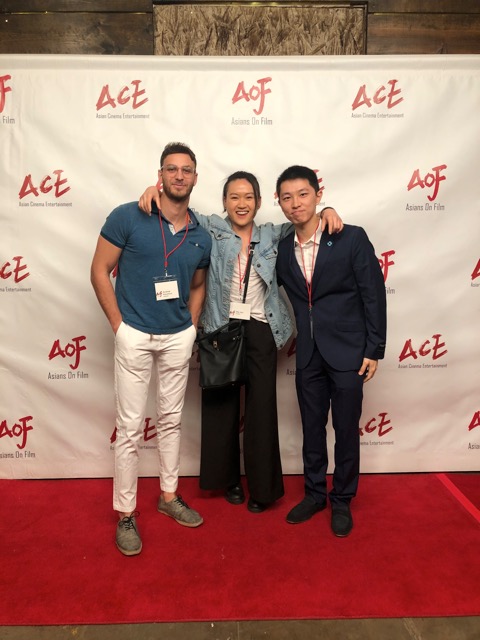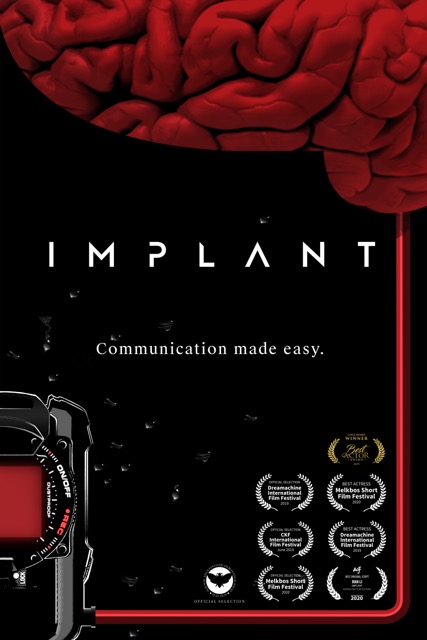
Science Fiction fans are proud of noting how many groundbreaking technological advances were hinted at, perhaps even birthed, by the gadgets written about by authors of this genre. While this is most certainly true, literature and film have also done an excellent job in telegraphing the potential pitfalls of technology. The film Implant may be the perfect description of how the potential integration of tech into our personal life can be used against us in an unexpected way. The film rebukes relying on said gadgetry in deference to exploring the social and emotional costs of its use. At the center of the film is a remarkable trio that includes Hayes Beyers Beyersdorfer dorfer (as George), Constance Parng as Betty (of triple Oscar winning film Black Panther, Ant-Man and the Wasp, Star Trek: Discovery), and Effy Han as Emily. The role of Emily earned a ‘Best Actor Award – New York’ for Han in her portrayal of a concerned wife who utilizes the latest advancements to solve a problem as old as the institution of marriage itself. With Implant, Effy and the entire production have found a new twist to a classic tale, resulting in awards like Best Original Script at the Asians on Film Festival and others.

As the name suggests, Implant takes the computer/human relationship to a very literal point in the not too distant future where an implanted device can link our brains to a computer system. With the majority of the population wired for this, an immense database of human memory exits; one which is ripe for hackers. When Emily fears that her absent husband is having an affair rather than working all of those late hours at the office, she convinces her friend Becca to help her gain access to George’s memories and see if there are accounts of infidelity there. Becca is a doctor specializing in hippocampus reading. It’s these attempts to infiltrate George’s memories that directly lead to his grounds for a justifiable divorce or even legal action. It’s the concealed accomplice of this cheating husband which is the big reveal of the film.

Emily is dichotomous from the early part of the film. She loves her husband and is truly gentle yet she’d rather break the law by hacking into his memories than have an honest discussion about her concerns. This very fact is deeply telling about Emily and her marriage. Effy describes her approach to the role in stating, “I’ve never been in a marriage before, so to understand and portray the different energy that comes from marriage is quite challenging, and a lot of fun. I created a background story where Emily is the victim of this marriage; not of physical abuse but rather emotional abuse. Domestic abuse comes in many forms and emotionally abusive marriages are not uncommon. I did research on victims of passive-aggressive partners and that really gave me the tools to work on Emily.” Like the concentric circles of the rings found inside a tree, the events of the film give opportunity for Effy to hint at the complexity found within Emily. There’s a constant sense that her motivations are not overt or superficial but instead deeply rooted in some hidden emotional compartment. The very first scene of the film implies an uneasiness between Emily and her husband but it’s the moment in which she asks Becca to break the law and access George’s memories that we understand she is willing to take a major ethical and legal leap to discover the truth. In what might be considered her most shining moment of the film, Effy’s delivery of Emily’s untethered state as she decides whether to grant her husband a divorce or send her best friend to jail as a collaborator in her crime is riveting.
Even though Implant falls into the Science Fiction genre, Effy is adamant that her lead role in the film wasn’t a drastically different experience for her. She explains, “I believe whatever reality we’re living in, human nature doesn’t change. The work of actors requires us to walk into a world that’s different from our own all the time. Working on a sci-fi film is no different than working in a period piece or one which takes place in present day. The core of our work remains the same; dive deep into a character and bring it back to life. Acting in a sci-fi project demands imagination to visualize a world that’s fundamentally different from the present day and to use/operate new technology with confidence just like you’ve done it a thousand times.” True to her own words, Effy Han’s depiction of Emily in Implant is relatable regardless of the time period in which it takes place. Like Bladerunner or Westworld, Implant takes us out of our current experience and in so doing, allows us the freedom to see the humanity of the situation in a less encumbered manner.
Writer : Angela Cooper


Be the first to comment on "Effy Han Displays the Ethical and Legal Quandary of Technology and Marriage in Implant"